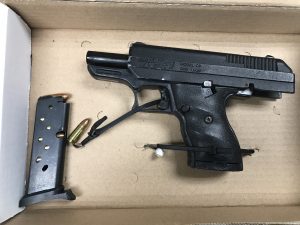 Montgomery County Police officers recently arrested a 67-year-old man after he was pulled over while driving a van with activated flashing blue and red lights. The Montgomery Village man’s Ford also sported the words police and the insignia of HAPCOA, which is the Hispanic American Police Command Officers Association. Upon being approached by the stopping officer, the driver responded attempted to explain that he was a former police officer and then declared that he was working with authority from the Maryland Secretary of State. This explanation did not satisfy the officer, who later ordered the driver out of his vehicle and immediately placed him in handcuffs for possessing a weapon, which turned out to be a replica. Search of the vehicle incident to arrest revealed numerous law enforcement related items including a ballistic vest, shirt labeled “HAPCOA POLICE”, baton, taster in a holster, handcuffs, Baltimore City Police badge and police tape. The man was arrested for impersonating a police officer and was taken to the Montgomery County Detention Center. He was also issued multiple traffic citations for driving with flashing lights without authorization and driving with visible blue lights, which are payable citations.
Montgomery County Police officers recently arrested a 67-year-old man after he was pulled over while driving a van with activated flashing blue and red lights. The Montgomery Village man’s Ford also sported the words police and the insignia of HAPCOA, which is the Hispanic American Police Command Officers Association. Upon being approached by the stopping officer, the driver responded attempted to explain that he was a former police officer and then declared that he was working with authority from the Maryland Secretary of State. This explanation did not satisfy the officer, who later ordered the driver out of his vehicle and immediately placed him in handcuffs for possessing a weapon, which turned out to be a replica. Search of the vehicle incident to arrest revealed numerous law enforcement related items including a ballistic vest, shirt labeled “HAPCOA POLICE”, baton, taster in a holster, handcuffs, Baltimore City Police badge and police tape. The man was arrested for impersonating a police officer and was taken to the Montgomery County Detention Center. He was also issued multiple traffic citations for driving with flashing lights without authorization and driving with visible blue lights, which are payable citations.
Despite the serious nature of the offense, a District Court Commissioner made the appropriate decision to release the defendant on an unsecured bail, so he did not have to spend the night in jail. His case is currently set for trial in mid-October at the Rockville District Court, though it remains to be seen if the case will be resolved on that day. It does appear that a motion to suppress evidence was filed, which means the defense may try to argue that the arrest was unlawful, and thus the search incident to arrest that revealed all the police paraphernalia should be excluded. Motions to suppress are typically argued on the day of trial in district court cases, when all witnesses are scheduled to be present.
The Maryland Public Safety Code section 3-502 describes three main scenarios where a person could be charged with impersonating a police officer. The first is when a person is accused of falsely representing themselves as a police officer with fraudulent design. It is not completely clear whether the driver identified himself as a police officer but upon hearing the full interaction on body worn camera a judge or jury could make this conclusion. They would then have to also conclude that the identification as law enforcement was done with fraudulent design. It is not illegal to simply advertise yourself as police, as this type of language, without more, could be considered protected speech under the First Amendment. The second type of police impersonation occurs if a person is accused of wearing, displaying or simply having a police badge, shield, patch or identification that is used by police officers in the state of Maryland. This portion statute would appear to apply to this case, though if the search is deemed to have been unlawful then the police badge would not be admissible in evidence. Finally, the State can prove a police impersonation case by offering evidence that a defendant possessed or used an imitation police article for the purpose of deception. The defendant in this case clearly used police style lights and possessed numerous imitation police equipment, but the issue for the fact finder would be whether these items for possessed or used for the purpose of deception. We have dealt with numerous police impersonation cases where a driver is accused of using police lights to frighten or intimidate another driver or even effectuate a fake traffic stop. If proven, these types of acts would qualify as deception. However, in this case the man appeared to simply be driving with his imitation police lights, which without more, may not satisfy the deception prong.
 In 2023 the Maryland Legislature passed the Gun Safety Act, which among other things, aimed to limit where firearms could legally be possessed within the state. It was created in large part as response to a Supreme Court decision that upheld rights to possess and carry firearms under the Second Amendment just one year earlier. Under the Bruen case, the Supreme Court struck down a harsh Maryland restriction on obtaining concealed carry permits, which resulted in the issuance of thousands more permits. In response, many lawmakers felt the need to strike back by limiting where lawful permit holders could carry their handguns. Sensitive places exceptions were applied to delineate these no carry zones, but it was only a matter of time before gun rights advocates sued to declare these exceptions an unconstitutional infringement of the Second Amendment. So called “sensitive places” under Maryland Criminal Law 4-111 include government buildings such as courthouses and state agency buildings like the MVA, public transportation, school grounds, state parks and forests, museums, hospitals and doctor’s offices, stadiums and casinos and locations that sell alcohol. Areas within 1,000 feet of a public demonstration and private property that is held open to the public also fell under sensitive places laws.
In 2023 the Maryland Legislature passed the Gun Safety Act, which among other things, aimed to limit where firearms could legally be possessed within the state. It was created in large part as response to a Supreme Court decision that upheld rights to possess and carry firearms under the Second Amendment just one year earlier. Under the Bruen case, the Supreme Court struck down a harsh Maryland restriction on obtaining concealed carry permits, which resulted in the issuance of thousands more permits. In response, many lawmakers felt the need to strike back by limiting where lawful permit holders could carry their handguns. Sensitive places exceptions were applied to delineate these no carry zones, but it was only a matter of time before gun rights advocates sued to declare these exceptions an unconstitutional infringement of the Second Amendment. So called “sensitive places” under Maryland Criminal Law 4-111 include government buildings such as courthouses and state agency buildings like the MVA, public transportation, school grounds, state parks and forests, museums, hospitals and doctor’s offices, stadiums and casinos and locations that sell alcohol. Areas within 1,000 feet of a public demonstration and private property that is held open to the public also fell under sensitive places laws.
 In 2023 the Maryland Legislature passed the Gun Safety Act, which among other things, aimed to limit where firearms could legally be possessed within the state. It was created in large part as response to a Supreme Court decision that upheld rights to possess and carry firearms under the Second Amendment just one year earlier. Under the Bruen case, the Supreme Court struck down a harsh Maryland restriction on obtaining concealed carry permits, which resulted in the issuance of thousands more permits. In response, many lawmakers felt the need to strike back by limiting where lawful permit holders could carry their handguns. Sensitive places exceptions were applied to delineate these no carry zones, but it was only a matter of time before gun rights advocates sued to declare these exceptions an unconstitutional infringement of the Second Amendment. So called “sensitive places” under Maryland Criminal Law 4-111 include government buildings such as courthouses and state agency buildings like the MVA, public transportation, school grounds, state parks and forests, museums, hospitals and doctor’s offices, stadiums and casinos and locations that sell alcohol. Areas within 1,000 feet of a public demonstration and private property that is held open to the public also fell under sensitive places laws.
In 2023 the Maryland Legislature passed the Gun Safety Act, which among other things, aimed to limit where firearms could legally be possessed within the state. It was created in large part as response to a Supreme Court decision that upheld rights to possess and carry firearms under the Second Amendment just one year earlier. Under the Bruen case, the Supreme Court struck down a harsh Maryland restriction on obtaining concealed carry permits, which resulted in the issuance of thousands more permits. In response, many lawmakers felt the need to strike back by limiting where lawful permit holders could carry their handguns. Sensitive places exceptions were applied to delineate these no carry zones, but it was only a matter of time before gun rights advocates sued to declare these exceptions an unconstitutional infringement of the Second Amendment. So called “sensitive places” under Maryland Criminal Law 4-111 include government buildings such as courthouses and state agency buildings like the MVA, public transportation, school grounds, state parks and forests, museums, hospitals and doctor’s offices, stadiums and casinos and locations that sell alcohol. Areas within 1,000 feet of a public demonstration and private property that is held open to the public also fell under sensitive places laws.
 Criminal Defense Lawyer Blog
Criminal Defense Lawyer Blog










